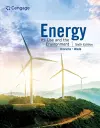
Energy
2 authors - Paperback
£80.99
Roger Hinrichs is presently a professor emeritus of physics at SUNY-Oswego. At SUNY-Oswego he was previously a professor of physics and department chair, and he taught energy-related courses for over 25 years. His training is in experimental nuclear physics, and his research involves studies of trace materials in environmental and biological samples using PIXE with Oswego's Van de Graaff particle accelerator. He has an interest in energy use in developing countries, and spent time in Kenya and India, as well as one year as a Fulbright Scholar in the sultanate of Oman. Additionally, he spent four years as a visiting professor at the Weill Cornell Medical College in Qatar. He co-directed the Institute in Energy Education, a program for secondary school science and technology teachers. In its 20 years, this program has impacted over 500,000 students and has won numerous awards. Dr. Hinrichs also supports active inquiry-based learning in the classroom; some of the activities in this text come from his course, Physics for Elementary Education Majors." He has worked as a consultant at local, state and national levels on matters of energy policy and energy technologies." Merlin H. Kleinbach received his Bachelor's degree from Westmar College, IA; his Masters degree from Colorado State College, 1955; and a doctorate in education from the University of Missouri in 1959. He has taught high school science and industrial arts in Colorado, and college courses in woodworking technology, metals technology, and basic electronics as well as Professional Education graduate courses for seven years at Wayne State College in Nebraska. Given an opportunity to teach and travel overseas, he took a position at Haile Selassie I University in Addis Ababa, Ethiopia, for four years (1966-1970), assisting in developing a teacher education program to prepare technology teachers for the newly developed comprehensive school program there. The University employed faculty from several dozen different countries from around the world, providing real insights into other cultures, their concerns, and potential. During this period, he and his family traveled extensively to countries in Europe, Africa, and Asia. Dr. Rachel Wade is the department chair for physics and astronomy at Edmonds College in Lynnwood, Washington, where she teaches physics, weather and oceanography. Her scientific training is in physical oceanography with an emphasis on climate science. Dr. Wade holds a bachelor’s degree in physics from Whitman College. Her master’s degrees in physical oceanography and in science education, along with her doctorate in higher education, are from the University of Washington. Her research has focused on STEM education in two-year colleges to include integrating polar science into physics curriculum, identity and inclusion in STEM, and problem-based learning in physics. Dr. Wade serves as the faculty advisor for the Edmonds Math Science Engineering Achievement Community College Program. Outside of academia, she also has more than 25 years of service in the U.S. Navy Reserve, where she serves as a naval oceanographer.